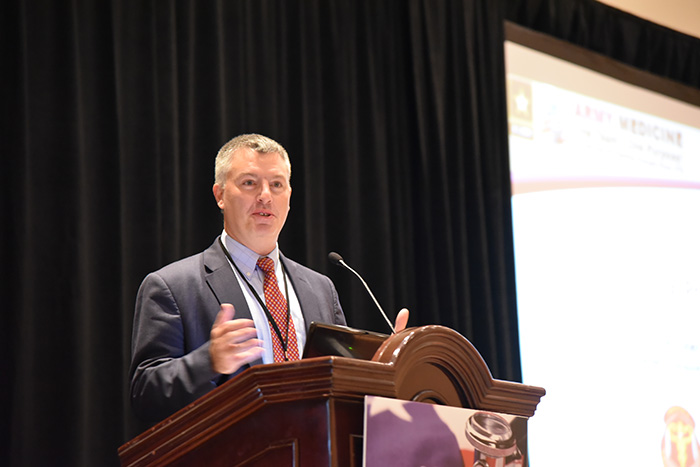Experts Talk Medical Acquisition and Logistics at Military Health Symposium

What does it take to get a new product into the hands of the Soldier, Sailor, Airmen or Marine on the battlefield?
The U.S. Army Medical Materiel Agency's Deputy to the Commander for Acquisition Dr. Tyler Bennett led a lunch-time session addressing that question during the 24th annual Military Health System Research Symposium in Kissimmee, Florida Aug. 15-18. MHSRS is the Department of Defense's premier scientific annual meeting, bringing together nearly 2,500 military, academic and private health sector researchers to discuss advances and ways forward for the military's medical system.
Bennett's message was clear to hopeful vendors and researchers: USAMMA is eager to work with industry partners to help deliver capabilities to Warfighter – with a focus on products that are lighter, smaller and less costly to maintain.
In step with the Army Operating Concept, as the Army restructures, Army Medicine must reduce the footprint of unnecessary medical materiel. Excess materiel poses capability, equipping, transportation, and sustainment challenges.
"A lot of people don't realize that sometimes the largest cost for devices is the sustainment piece, such as calibration, maintenance and storage," said Bennett. "USAMMA looks at that upfront to ensure that the things that we are buying are sustainable and affordable in the long run."
Bottom line: medical materiel has to add significant value over logistical burden.
The session highlighted USAMMA's overall mission to develop, tailor, deliver and sustain medical materiel capabilities and data in order to build and enable health readiness. USAMMA, a subordinate organization of the U.S. Army Medical Research and Materiel Command, executes this mission by developing products in accordance with requirements, regulations and policies. USAMMA also provides critical expertise in sustainment planning for pharmaceuticals, devices and biologics, managing the entire medical materiel lifecycle process.
Bennett also highlighted USAMMA's specific acquisition focus areas, based on current Army requirements, including hemorrhage control, traumatic brain injury and post-traumatic stress disorder, eye/vision preservation, wearable sensors, telehealth and medical evacuation.
Potential partners have two avenues to connect with the USAMRMC or USAMMA, including:
- Military Health System Vendor Days:
http://www.health.mil/VendorDay

- USAMRMC's New Products and Ideas system:
http://mrmc-npi.amedd.army.mil

Military Health System Vendor Days is organized by the Defense Health Agency and held eight times a year at Fort Detrick, Maryland. Vendors must register in order to showcase their products during this event.
Megan McGee, USAMMA product manager added, "It's a great opportunity to get your ideas in front of an audience."
The New Products and Ideas system is a free online portal that allows Army subject matter experts to assess products and ideas, evaluate their applicability to USAMRMC's mission, and provide feedback to the submitter. It provides the vendor an opportunity to showcase their product or idea without needing to travel to Fort Detrick and without giving anyone an unfair competitive advantage. Of note, USAMRMC does not award contracts, provide research grants, or offer other forms of financial support through the NPI. Likewise, USAMRMC does not purchase or obtain programs, services or products through the NPI.
All requirements and funding opportunities are advertised through
fedbizopps.gov and
grants.gov
and
grants.gov .
.
 An official website of the United States government
An official website of the United States government
 ) or https:// means you've safely connected to the .mil website. Share sensitive information only on official, secure websites.
) or https:// means you've safely connected to the .mil website. Share sensitive information only on official, secure websites.


